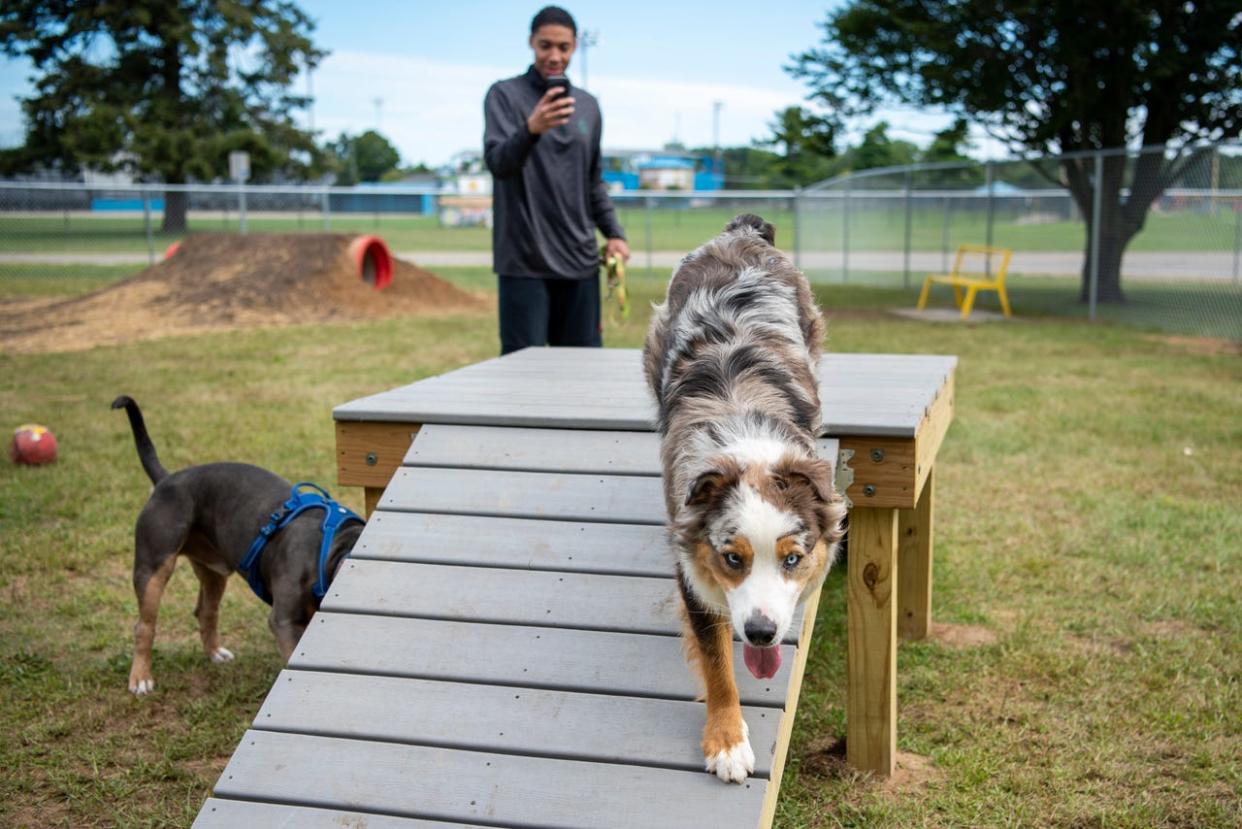Dog owners urged to stay on top of vaccinations amid canine parvovirus outbreak in northern Michigan

BATTLE CREEK — The Humane Society of South Central Michigan is urging area pet owners to get their dogs vaccinated amid a recent uptick of canine parvovirus cases in Michigan's northern Lower Peninsula.
"Parvovirus is an easily preventable illness, with deadly consequences," Jessica Gilbert, executive director of the Humane Society of South Central Michigan, said. "The vaccine is relatively inexpensive and easy to get, but not everyone in Calhoun County vaccinates their pets. Basic vaccines for dogs and cats are the number one way to prevent illness and death. Dogs and cats should also see a veterinarian for a yearly wellness exam."
Canine parvovirus can affect all dogs, but unvaccinated dogs and puppies younger than four months old are the most at risk, according to the American Veterinary Medical Association. The virus affects dogs' gastrointestinal tracts and is spread by direct dog-to-dog contact and contact with contaminated feces, environments, or people.
The virus was first reported in Otsego County where about 30 dogs — privately owned, mostly unvaccinated — have died, Otsego County Animal Control Director Melissa FitzGerald told the Detroit Free Press. FitzGerald said that it does not appear that the dogs have had contact with each other.
The latest outbreak hasn't affected dogs in the lower portion of the Lower Peninsula to this point, but parvovirus is "always a concern," Gilbert said.
Roger Ballard strolled through the newly opened Springfield Dog Park Thursday with his husband Jim and their long hair miniature dachshunds Logan and Frankie. He said he's not overly concerned about the latest outbreak because his dogs are older and vaccinated.
"Socially, they come out but they don’t necessarily intermingle a lot with other dogs and we surely try to keep them from sniffing what other dogs may have left behind, which is kind of (how it’s being spread)," Ballard said.
Michael Delaware, accompanied by his dog Mocha, said it's important to pick up after your canine friend, particularly in public spaces.
"It seems like every summer there’s some announcement of a parvo-type thing," Delaware said. "The best thing is to keep your dogs clean, make sure they’re not sniffing other dogs’ poop and read up online about it. We try to encourage people to pick up after their dogs when they’re at the dog park."
Parvovirus can stay in the environment, on surfaces or in the soil, for a very long time and is resistant to many cleaners, Gilbert said. The Humane Society hears of cases of parvovirus at least a few times a month, mostly from individuals who call to ask for help paying for emergency care for their dogs who have parvovirus, she said.
"Individuals who don't have their dogs vaccinated and take them to local dog parks or out in the community pose a real danger to other dogs," Gilbert said. "We recommend individuals do not take dogs that are not fully vaccinated to stores, parks, or public places, especially puppies. Annual wellness exams and vaccinations recommended by your veterinarian based on your dog or cat's risk is the most important thing you can do to keep them healthy."
Kim Dodd, director of Michigan State University's Veterinary Diagnostic Laboratory, confirmed in a Wednesday news release that dogs infected with the canine parvovirus in northern Michigan did not have a history of complete vaccination.
The Michigan Department of Agriculture and Rural Development (MDARD) encourages all dog owners to take a few simple steps to protect their animals:
• Keep up with routine vaccinations by ensuring dogs/puppies are vaccinated against canine parvovirus, rabies, canine distemper, adenovirus, parainfluenza, and leptospirosis by a veterinarian.• Have dogs/puppies fully vaccinated before interacting with other animals to keep them healthy and safe.• Keep dogs/puppies at home and away from other dogs if they are exhibiting any signs of illness and contact your veterinarian.• Be sure to clean up after your pet when you’re walking them in public.
Reporter Patricia Alvord contributed to this report.
Contact reporter Greyson Steele at gsteele@battlecreekenquirer.com or 269-501-5661. Follow him on Twitter: G_SteeleBC
This article originally appeared on Battle Creek Enquirer: What you need to know to keep your dog safe from parvovirus

